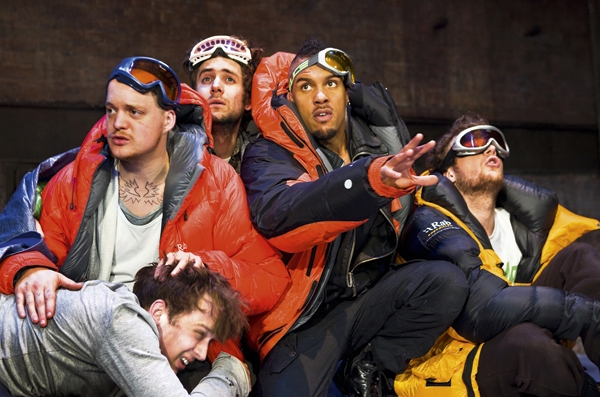We all know the ‘excellence theory’ of migration. Barriers to entry guarantee that imported cargoes have outstanding qualities. Manfred Karge’s parable of urban despair in the Ruhr comes to the UK with high expectations. It’s been here before. Director Stephen Unwin premièred the play at Edinburgh, 1987. His new revival at the Arcola demonstrates that the ‘false charm theory’ of migration also applies. The foreign and the exotic can mesmerise us more easily than the homegrown. Unwin sets the play in some vague tower-block ghetto. We meet a quartet of jobless alcoholics who become fascinated by Amundsen’s trip to the South Pole. By impersonating Norwegian explorers, the drunken lunks briefly discover some purpose in their sozzled lives.
Clearly, the lunks’ worship of Amundsen is meant as an emblem of their ‘alienation’. What mundanities march under that hallowed banner. Alienation is a cover story for welfare cast-offs born without curiosity, guts or initiative in a society prosperous enough to raise them in complete security. The script is designed with displeasure in mind. The virtues of good plays — compelling characters, a fascinating mission and an uncertain outcome — have been turned upside-down. We have nasty characters, a daft mission and an outcome no one cares about.
Karge’s harsh, overcrowded dialogue is full of fidgety repetitions and pretentious soliloquys. There’s casual bigotry everywhere. Non-whites are ridiculed. Women exist to get humped, thumped or dumped. If the producers’ hope was to stage the worst play in Europe and to boost our appreciation of native writing they’ve scored a triumph. And Unwin has laid on a masterclass in misdirection. He gives no depth or variety to this laborious, glib, confused, pointless, demeaning and relentlessly ugly caper. Each of the lunks yells every single line. A fifth character, playing an excitable dog, doesn’t yell. He yaps instead. Please, I found myself praying, stop yapping and start yelling like the rest.
As it happens, I’ve been deaf in one ear for a fortnight so by discreetly turning my head I was able to halve my evening’s agonies. Soon the show moves to Unwin’s home theatre, the Rose, in Kingston-upon-Thames. Form up neatly on the bridge, chaps, and start throwing yourselves off.
Bola Agbaje cracks out new scripts in no time. Her latest play deals with politics and racial identity. We meet Kayode (Lucian Msamati), a black British MP, who lost his seat after accusing an opponent of anti-African bias. To lick his wounds he pops back to Nigeria to visit his mum. But he’s all at sea here. He tips beggars and uses cutlery rather than eating with his right hand. Nigerians call him ‘Englishman’ and laugh at him for talking ‘Oyinbo’ or ‘white’. He gets into an argument over bribery with a corrupt chieftain. Blows are exchanged. Revenge follows. Kayode is arrested, beaten up and forced to pay a huge bribe in return for his life. He then stands against the chieftain in elections and tries to win support as the anti-corruption candidate. More bloodshed results.
There’s almost too much narrative ore in this packed script. And Agbaje’s sense of power politics isn’t entirely convincing. She’s overfond of the sauce-bottle too. A gore-drenched character staggers in and shifts the plot in a new direction. Once, that’s fine. Twice looks like a ketchup addiction.
Kayode’s emotional back story is more believable. His British wife, Rita, and his Nigerian sister, Fola, bitch at each with tender, needling viciousness. ‘I cannot stay mad at my junior sister for long,’ smiles Fola. ‘Now what is going on with this hairstyle of yours?’
Agbaje can write a hysterical matriarch better than anyone since Jennifer Saunders. Kayode’s crazy mum refuses to visit him in London. ‘English weather hates me. It’s always trying to attack me. It’s a soul-stealer.’ She clings to her belief that Rita, who is black, is a white sorceress who has bewitched her son. ‘I’m glad you are divorcing that useless wife of yours,’ she says, groundlessly. The play shines in these domestic scenes. And while Agbaje’s male characters tend to be brittle, macho hotheads, her women are fabulous creations: oblique, densely layered, manipulative but brimful of plain-speaking warmth. Great performances, too.
Noma Dumezweni is wonderful as the sassy and laconic Rita. ‘I don’t wanna have to deal with her black-magic mumbo-jumbo,’ she says of her posturing mother-in-law played with great verve by Pamela Nomvete. And Richard Pepple gets big laughs as the thuggish, over-touchy chieftain. The script may be too cramped as a 90-minute play but over six hours of television it could breathe a bit and spread itself out. Commissioning editors may worry that the identity crisis of British-born Africans is too limited for mainstream audiences. They needn’t. The faultline between loyalty to one’s past and a desire to forge a new destiny is universal.







Comments